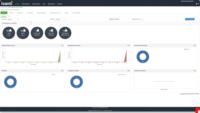Ivanti Connect Secure vs. pfSense
Ivanti Connect Secure vs. pfSense
| Product | Rating | Most Used By | Product Summary | Starting Price |
|---|---|---|---|---|
Ivanti Connect Secure | N/A | Ivanti Connect Secure provides an SSL VPN solution for remote and mobile users from any web-enabled device to corporate resources - anytime, anywhere. Connect Secure (ICS) is a widely-deployed SSL VPN for organizations of any size, across every major industry. | N/A | |
pfSense | N/A | pfSense is a firewall and load management product available through the open source pfSense Community Edition, as well as a the licensed edition, pfSense Plus (formerly known as pfSense Enterprise). The solution provides combined firewall, VPN, and router functionality, and can be deployed through the cloud (AWS or Azure), or on-premises with a Netgate appliance. It as scalable capacities, with functionality for SMBs. As a firewall, pfSense offers Stateful packet inspection, concurrent… | $179 per appliance |
| Ivanti Connect Secure | pfSense | |||||||||||||||
|---|---|---|---|---|---|---|---|---|---|---|---|---|---|---|---|---|
| Editions & Modules | No answers on this topic |
| ||||||||||||||
| Offerings |
| |||||||||||||||
| Entry-level Setup Fee | Required | No setup fee | ||||||||||||||
| Additional Details | — | — | ||||||||||||||
| More Pricing Information | ||||||||||||||||
| Ivanti Connect Secure | pfSense |
|---|
| Ivanti Connect Secure | pfSense | ||||||||||||||||||||||||||||||||||||
|---|---|---|---|---|---|---|---|---|---|---|---|---|---|---|---|---|---|---|---|---|---|---|---|---|---|---|---|---|---|---|---|---|---|---|---|---|---|
| Firewall |
|
| Ivanti Connect Secure | pfSense | |
|---|---|---|
| Small Businesses | Norton 360 Score 7.0 out of 10 | Sophos UTM Score 8.8 out of 10 |
| Medium-sized Companies |  Quantum Firewalls and Security Gateways Score 9.3 out of 10 |  Quantum Firewalls and Security Gateways Score 9.3 out of 10 |
| Enterprises |  Quantum Firewalls and Security Gateways Score 9.3 out of 10 | Palo Alto Networks Virtualized Next-Generation Firewalls - VM Series Score 9.2 out of 10 |
| All Alternatives | View all alternatives | View all alternatives |
| Ivanti Connect Secure | pfSense | |
|---|---|---|
| Likelihood to Recommend | 7.6 (3 ratings) | 9.3 (30 ratings) |
| Usability | - (0 ratings) | 9.7 (8 ratings) |
| Support Rating | 7.6 (2 ratings) | 10.0 (1 ratings) |
| Ivanti Connect Secure | pfSense | |
|---|---|---|
| Likelihood to Recommend |  Ivanti
|  Netgate (Rubicon Communications, LLC)
|
| Pros |  Ivanti
|  Netgate (Rubicon Communications, LLC)
|
| Cons |  Ivanti
|  Netgate (Rubicon Communications, LLC)
|
| Usability |  Ivanti No answers on this topic |  Netgate (Rubicon Communications, LLC)
|
| Support Rating |  Ivanti
|  Netgate (Rubicon Communications, LLC)
|
| Alternatives Considered |  Ivanti
|  Netgate (Rubicon Communications, LLC)
|
| Return on Investment |  Ivanti
|  Netgate (Rubicon Communications, LLC)
|
| ScreenShots | Ivanti Connect Secure Screenshots |









